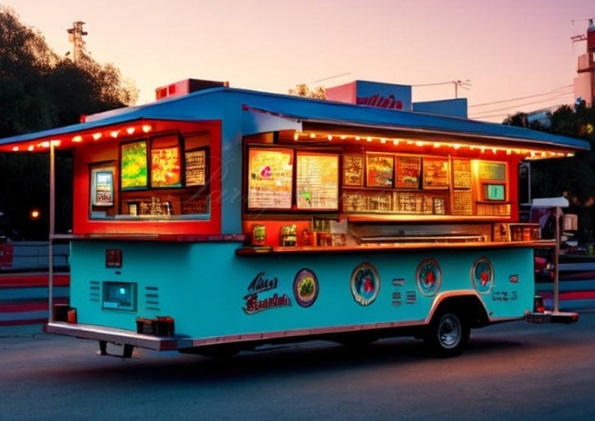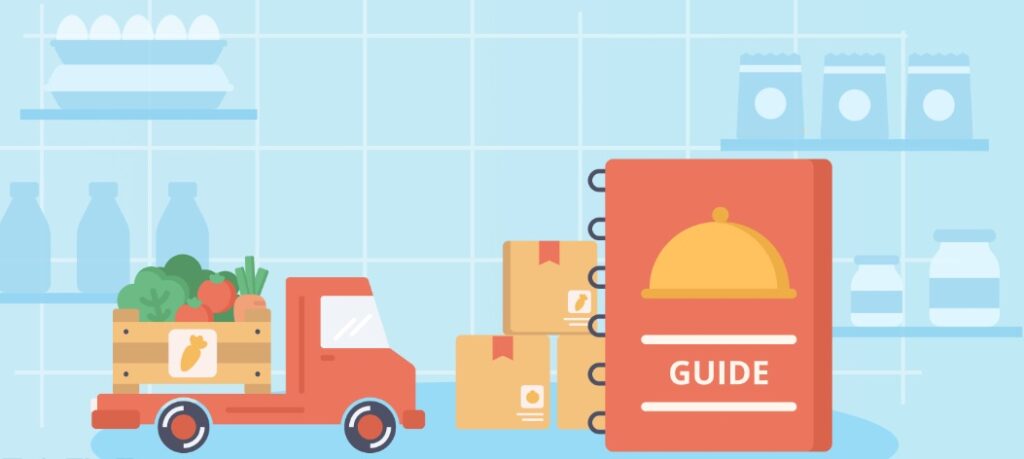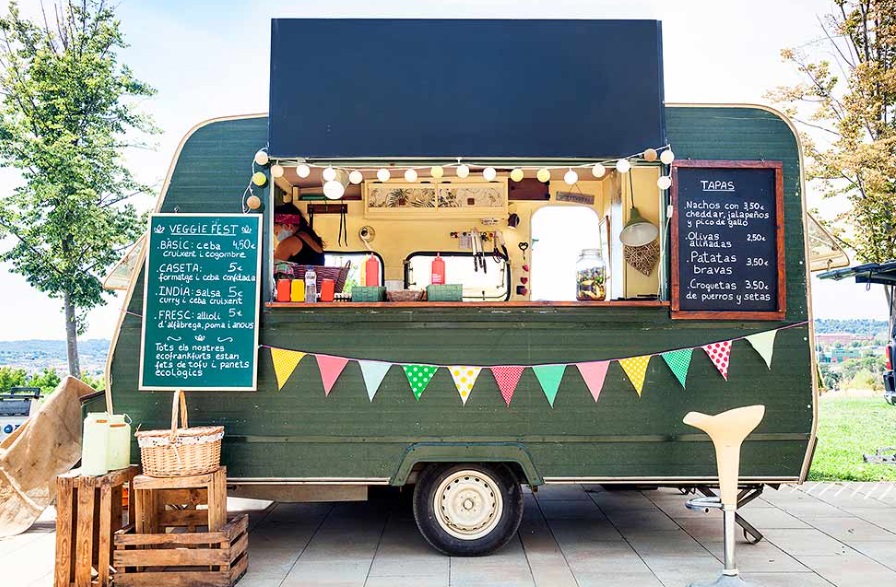If you’re looking to How to Start Food Truck Business in india, here’s a step-by-step guide to help you get start your business.Our food truck business is not just a mobile food delivery service it’s a dynamic kitchen experience that comes straight to you. From the crunch of the blackened burgers to the aroma of the freshly made tacos, every dish is made with love and courtesy, aimed not just at satisfying hunger, but at delighting your senses.
Our strategy relies on accessibility and innovation. By locating our truck in deep locations and at popular events, we ensure that our offerings reach a diverse audience seeking new flavors. Our menu is not just about variety, but about quality and creativity. We regularly revise our recipes, using local fresh ingredients, so that every bite is a food delight.

Customer interaction is at the core of our success. Through social media updates and real-time location tracking, we connect with the community, building expectation and trust. Our dedication to excellent service goes beyond just delicious food consumption; It’s all about creating an experience that leaves a long-lasting impression.
In the competitive food industry, our food truck is renowned for its distinctive offerings and customer satisfaction. We believe in the power of good food to bring people together, and we aim to redefine food expectations with every single dish we prepare. Join us on this delicious journey with our food truck and redefine your food expectations with every single delicious dish, through an engaging experience.
Table of Contents
Step 1. The Benefits of Renting or Owning a Food Truck for Startup Success
Starting a business involves several important decisions, such as whether to rent or buy a food truck. Renting a food truck is a wise choice to reduce the initial upfront capital investment. This is usually a monthly expense that includes vehicle rental, depending on factors such as location and vehicle features.
Renting provides us with flexibility and minimizes financial risk in the initial stages. It allows us to test different locations, menu presentations and customer preferences without making significant upfront purchases. During this time, we can evaluate market demand and improve our business operations to make them prosperous and profitable.
Also, renting a truck helps us maintain financial stability while we establish a customer base and grow brand recognition. It also allows us to conserve capital for other important aspects such as marketing, inventory and staffing.

When the food truck business is successful in running and shows sustainable profitability, we can reconsider buying a food truck. Purchasing a food truck in this situation can provide long-term cost savings and greater operational control. It represents a strategic investment in the future expansion and growth of the food Truck business, consistent with our balanced financial vision.
In closing, leasing a food truck early is a calculated move that balances risk with opportunity in the marketing services industry. It lays the foundation for a scalable and sustainable business model, setting us up for long-term success and profitability in the vibrant mobile food service market.
Step 2. Optimizing Raw Material Sourcing for Food Truck Success
In the food truck industry, raw material procurement plays a vital role in increasing operational efficiency and attracting customers with the quality of the final product. Food truck operators usually rely on two main sources to obtain ingredients: wholesalers and local stores.
Wholesalers: These suppliers provide large quantities of goods at a cheaper rate. The advantage of buying from wholesalers is that there is a higher profit margin. As food truck operators purchase large quantities of ingredients such as burger patties, pastries, and specialty foods, they find the cost per unit to be lower.
The advantage of this possibility is that it helps them maintain competitive pricing and maximize profits. Wholesalers offer a variety of products in abundance, ensuring constant availability of the items needed to serve a menu. This consistency is important in a dynamic environment where the availability of ingredients can affect daily operations.
Local stores: While wholesalers are for large requirements, local stores offer flexibility and convenience. Food truck operators often turn to nearby markets and specialty stores to buy items in smaller quantities or to find specialty items that are not available from wholesalers.

This option offers the potential for more agile inventory management, allowing food trucks to quickly restock perishable items or adjust their menus based on seasonal availability and customer preferences.
Strategic Buying: Successful food truck businesses strike a balance between these two buying strategies. They use wholesalers for basic ingredients that are regularly in demand and benefit from the advantages of buying in large quantities.
They also use local stores to enrich their inventory with fresh fruit, craft products, or specialty items. This dual effort not only ensures cost-efficiency and product quality, but also enhances the kitchen variety and impact of the food truck business experience for customers.
Essentially, effective sourcing of raw ingredients whether it’s from wholesalers for volume savings or from local stores for flexibility – is critical for food trucks to provide quality food, remain profitable, and satisfy the diverse preferences of their customers.
Step 3. How to Start Food Truck Business in india: Important Investment Points
Starting a food truck business can be a relatively low-cost venture compared to setting up a traditional restaurant.
Generally, you can get started with an investment of ₹60,000 to ₹70,000, which mainly covers essential expenses such as purchasing a food truck or a used vehicle suitable for conversion, purchasing basic kitchen equipment such as stoves, refrigerators, and cooking utensils, obtaining necessary licenses and permits, initial raw materials and ingredients, and branding materials such as signage and menus.
The main advantage of a food truck business is its flexibility and lower overhead costs compared to brick-and-mortar establishments. You have the freedom to choose strategic locations based on foot traffic or events, reducing the need for expensive commercial rents.
Also, operating costs such as utilities and staff are typically lower, making it easier to achieve profitability.

To be successful, thorough planning is crucial. This includes researching your target market, developing a unique menu concept that resonates with local preferences, and ensuring compliance with health and safety regulations.
Effective marketing through social media, local events, and partnerships can also help attract customers and build a loyal following.
While the initial investment is relatively modest compared to other food service businesses, long-term success in the competitive food truck industry requires careful financial management and a focus on providing quality food and service.
Step 4. Shift anywhere and competition food truck business
Food trucks offer entrepreneurs a unique advantage in the competitive food service market. Unlike traditional brick-and-mortar establishments, food are free to change their location strategy based on demand, events, and seasonal trends.
This allows the movers to position themselves at conventions, events, and high-traffic areas, maximizing their exposure and sales potential. By reaching consumers directly, food avoid the limitations of a fixed location and have the ability to capitalize on changing consumer preferences and local trends.
In addition, this direct-to-consumer approach gives food truck business owners the opportunity to establish a more prominent relationship with their customers. They receive instant feedback, can see customer preferences firsthand, and can quickly adjust their offering to meet demand.
This flexibility is key to keeping up with the competition, as it allows them to quickly adapt and respond to market changes. Unlike larger food establishments that may struggle to quickly adjust their menus or business models, trucks can pivot almost instantly, ensuring they remain accessible and appealing to their target audience.

Additionally, the setup costs associated with trucks are lower than traditional restaurants, making them a more accessible option for aspiring entrepreneurs. This lower entry barrier means that more individuals are allowed to enter the market, nurturing a varied and vibrantfood truck business scene that constantly introduces new flavors and food experiences to consumers.
In conclusion, utilizing food trucks’ ability to shift and adjust based on changing consumer needs not only increases their visibility and sales potential, but it also promotes innovation and engagement in the customer experience.
By leveraging iterative and direct-to-consumer interactions, food Truck business entrepreneurs can meaningfully succeed in the competitive landscape of the food industry through unique personalized experiences provided directly to their customers.
To watch the video, click the link below…
Click the link to Read the Rencent Blog….
Start Dairy Business from Home: Towards Success at Low Cost


One thought on “How to Start Food Truck Business in india: A detailed and Simple Guidances (28)”